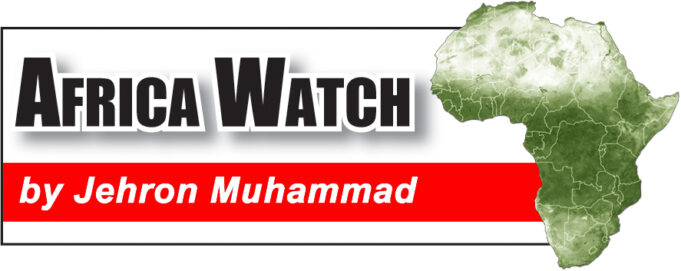The quest for African solidarity as is suggested by the formation of the African Economic Community Free Trade Area (AfCFTA) goes back to African leaders like Kwame Nkrumah and his desire for continent-wide economic decolonization.
“The hasty launch of AfCFTA without addressing critical challenges will not fulfill the intended objectives of structural transformation of African economies,” a recent editorial in the Kampala, Uganda-based Daily Monitor stated.
If this is Africa’s continental and regional organizations’ way of bringing in the new year and making ready to welcome a new U.S. president and his foreign trade initiatives, the continent may be in for a rude awakening.
Historically, Republican and Democratic presidents alike have “approached Africa primarily for access to, and control of … extractive industries and, at certain points, for counter-terrorism operations. This approach, under the influence of the cold war, translated into the U.S. supporting Africa’s strongmen, leaving vulnerable people struggling to survive their ruthlessness, while China cheered from the sidelines,” observed freelance writer and activist Vava Tampa in the Guardian, a UK-based newspaper.
The Monitor brought to light the open secret that under its current configuration AfCFTA’s winners will be big business, leaving small and fragile economies in the lurch.
The African trade agreement is the largest agreement the world has known since the creation of the World Trade Organization. It has the potential to bring together more than 1.2 billion people in a $2.5 trillion economic bloc.
But there are regional economic blocs with unresolved trade tensions and the “longstanding challenges” to “strong pillars” for intra-African trade, reported the Monitor. In addition, which products can be subject to tariffs and duties has of yet not been finalized.
This hasty launch, the Monitor suggests, will not fulfill the AfCFTA objectives of “structural transformation of African economies.”
It “will simply contribute to creating a bigger African market for further domination by foreign products and investors over African products and investors, and bigger producers over smaller ones,” warned the Monitor editorial board.
Senegalese Economist Dr. Ndongo Sylla appeared to agree. During a 2018 interview with the South African Broadcasting Corporation, he said “the idea of a common market for Africa has been advanced by leaders like Kwame Nkrumah.” “But what they said is something very clear. You cannot organize the continent on an economic level without some political unity,” he added.
Dr. Sylla believes in order for AfCFTA to be successful Africa at its base has to achieve “political unity,” which he calls the basis for economic integration. That includes “a continental army … one minister for foreign affairs … one common selling policy for raw materials and also the elimination of competition between Africans,” he said.
One of U.S. President Joe Biden’s first African trade policy initiatives could possibly be designed to assist AfCFTA by nullifying the Trump administration’s trade agreement with Kenya.
“Nairobi is reportedly concerned that the nascent deal could be dead in the water with the Biden administration opting to focus more attention on working via the African Continental Free Trade Area. This won’t only boost multilateralism in theory, it will also bolster the East African Community’s role as a negotiator—one undercut by both the Trump administration and Kenya itself,” according to theafricareport.com.
With over 20 years’ experience in tax issues relating to customs and excise and international trade, Johannesburg-based Virusha Subban believes trade issues will be top priority for the Biden administration, and strengthening relationships in a strategic cooperative way.
She says all future trade agreements signed between the U.S. and African countries will have to align with AfCFTA trade stipulations.
On the counter terrorism front President Biden’s promise to restore the United States’ global relations and alliances, according to the Institute for Security Studies, is designed to renew hope of America’s wider embrace of “multilateralism.” It is anticipated that deeper U.S. engagement will entail greater security cooperation with Africa, of which counter-terrorism is said to be key.
But Biden may have his hands too full with domestic issues, like the growing Covid-19 pandemic, to focus on events abroad. And a clear policy on domestic terrorism is needed.
This appears to mean African countries should focus on their own proactive approaches to problems and security. ISS suggests Africa seek “to first engage local capacities and actors, as opposed to raising expectations about foreign aid, troops and training from the U.S. America has a longstanding military footprint in Africa. Since 2001 the continent has been a focal point for U.S. military presence, especially the ‘global war on terror.’ In fact, since 9/11 … the U.S. military has built a sprawling network of outposts in more than a dozen African countries.”
During the same period of U.S. troop increases, “terror groups on the continent have increased. This raises doubt about the relevance of a continued U.S. military presence for counter-terrorism in Africa.”
Senior political scientist at the Rand corporation, Michael Shurking fittingly writes in a piece titled “What Joe Biden’s Africa Strategy Might Look Like,” “it is impossible to compete with the Chinese (and Iranians, Russians, Turks, etc.) when one is not even on the field. Secondly, attempts to steer sub-Saharan Africans away from rivals through messaging about, say, the Chinese government’s ulterior motives, may come off as hollow if Americans are acting no differently.
It also may be true that the United States government has been overly focused on security matters and providing security assistance. The security assistance is not a bad thing, but there may be more productive ways of investing in other countries’ institutions and societies.”
Follow @jehronmuhammad on Twitter.













